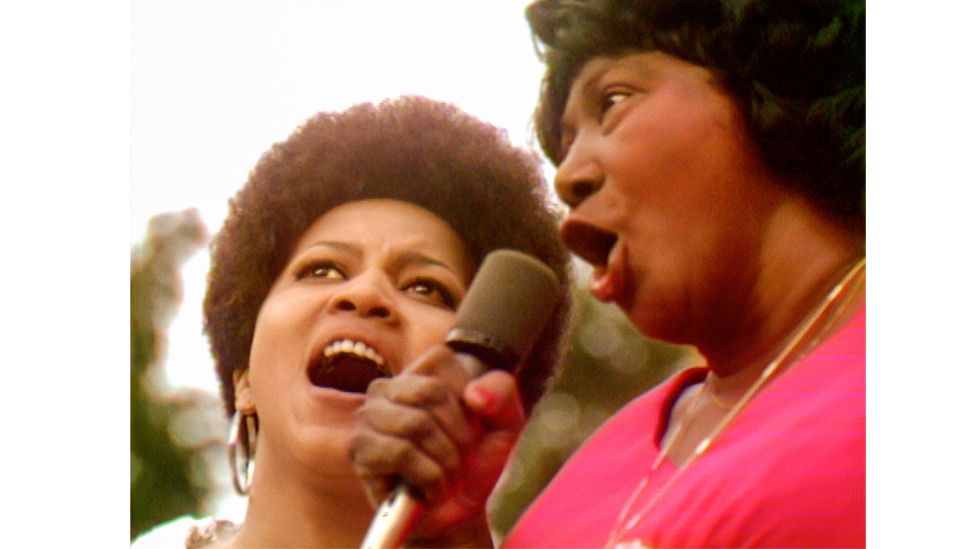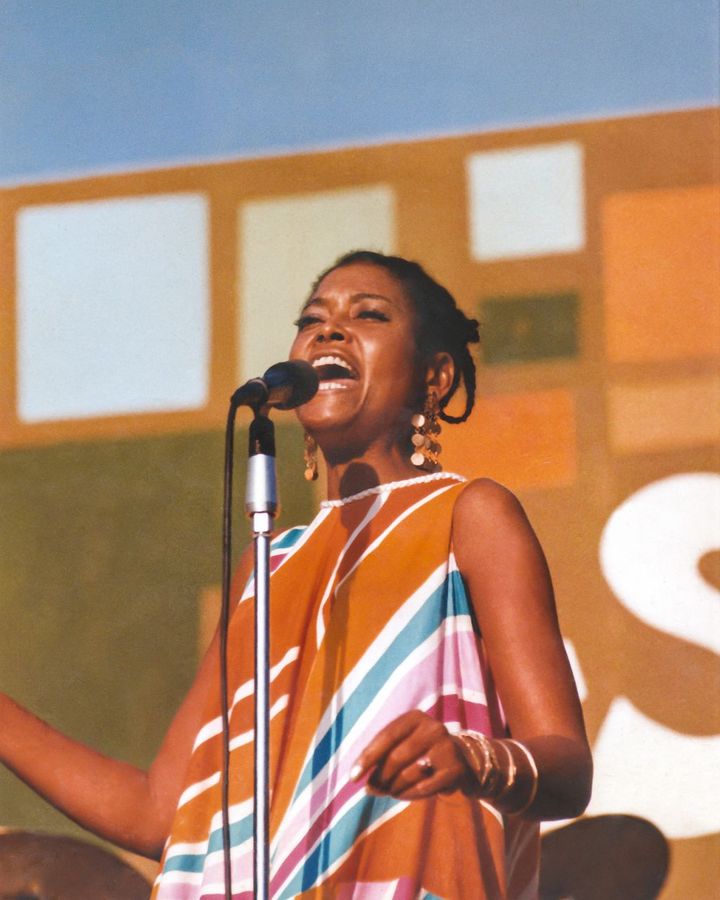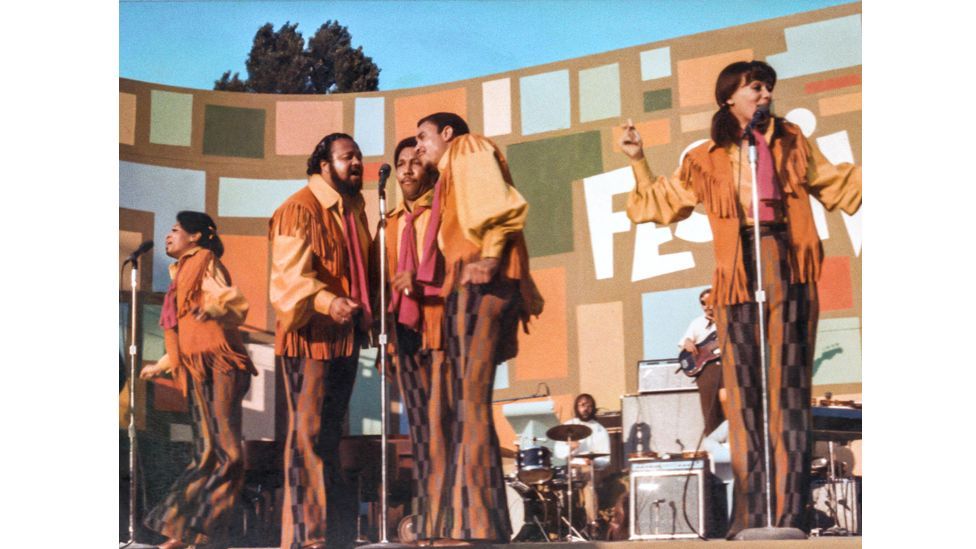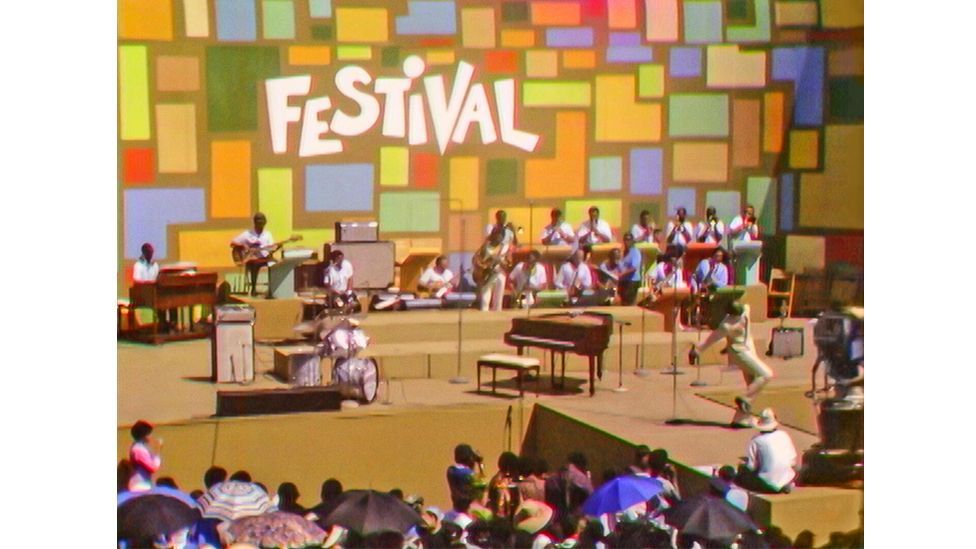In one astonishing performance after another, Stevie Wonder does a ferocious drum solo, Mahalia Jackson and Mavis Staples sing gospel together, Gladys Knight and the Pips do Motown, and BB King plays the Blues. All the while, thousands of people dance in the park, a few spectators sit in trees and the Black Panthers provide security. It was 1969 – the same summer as Woodstock – and for six consecutive Sundays, an outdoor celebration of black music and culture took place in the New York City neighbourhood of Harlem. More than 40 hours of performances from dozens of artists were recorded, then languished in a basement for nearly 50 years.
More like this:
- The perfect film for right now
- America's first black superstars
- The exhilarating songs of protest
The documentary Summer of Soul (... Or, When the Revolution Could Not be Televised) mixes those recordings with new interviews and archival footage to create a work with piercing resonance today. The summer before the concert, Harlem and 100 other communities across the US erupted in looting and protest after the murder of Martin Luther King, Jr. In his ambitious first film as director, Ahmir (Questlove) Thompson puts the concerts in the context of that moment of social unrest and change. There are great concert movies and great socio-political documentaries, but Summer of Soul combines both in one gloriously entertaining and intellectually astute film.

Mahalia Jackson and Mavis Staples sing gospel together at the 1969 concert (Credit: Courtesy of Searchlight Pictures)
Thompson – drummer and joint frontman of the hip-hop band The Roots, a DJ and an expert on pop-music history – brings to the film all his knowledge and his experience curating sound. News clips from the 1960s set up the decade's violence in a sequence so eloquent that it's easy to miss how strategically the pieces are assembled. A scene of John F Kennedy in his motorcade moments before he was shot leads to Malcolm X saying that JFK's assassination "was a result of the climate of hate"; then Martin Luther King commenting on Malcolm's murder; Robert Kennedy announcing King's death; and the assassination of Robert Kennedy himself, in a cascade of murdered heroes.
There are images of Harlem then, with crumbling buildings and a plague of drugs. Coming at the start of the film, those scenes instantly create texture and a sense of entering the past. While a concert film like Woodstock (1970) wants to immerse us in the experience of being there, Summer of Soul looks back to reclaim and re-envision the events. No wonder the film won the Audience Award and the Grand Jury Prize for Documentary at this year's Sundance Film Festival, a sign of its popularity as well as its thoughtfulness and aesthetic grace.

Jazz singer, actor and civil rights campaigner Abbey Lincoln is featured in the documentary (Credit: Courtesy of Searchlight Pictures)
The inception of the project is a revealing saga in itself. A veteran television director, Hal Tulchin, used five video cameras to capture the event, allowing for an immersive experience, with intimate close-ups of the singers' faces, wide shots of the stage and reactions from the crowd. Tulchin intended to sell the recording as a television special, pitching it as Black Woodstock. But that was before there were dozens of streaming services, before channels like BET and OWN embraced and supported black artists. No one was interested.
Maxwell House coffee had put up some of the money to stage the event, and Thompson slyly includes a condescending television commercial from the period in that section of the film. In the ad, a man's voice with a vaguely African accent is heard over a map of the continent, intoning dramatically, "At the heart of Instant Maxwell House is the little brown bean from the rich moist soil on the misty slopes of Africa." The snippet is presented without comment, a cringe-inducing revelation of what mainstream television was like in the late 60s.
The social context is deftly mixed with exuberant concert scenes. Some songs play out nearly in full; others are intercut with interviews or layered with audio comments over the music. The songs may seem like oldie hits now. But I Heard It Through the Grapevine, which Gladys Knight and the Pips sing with boundless energy, was then just a year old. Every performance sounds fresh. Jackson and Staples' duet on the hymn Take My Hand, Precious Lord seems like one generation's Gospel great passing the torch to another.

The 5th Dimension, who had a hit with the late '60s anthem Age of Aquarius, are among the artists featured in the film (Credit: Courtesy of Searchlight Pictures)
If Thompson had simply let the performances play out in a blast of nostalgia and joyfulness, that would have been satisfying enough. His original plan was to make a concert film, as he has explained in many published interviews since the movie's Sundance premiere. The scope changed partly because he realised how hard Tulchin tried to generate interest for television. "The fact that 40 hours of footage was kept from the public is living proof that revisionist history exists," Thompson says in the film's press notes. "I want to make sure that black erasure doesn't happen during my lifetime anymore."
Another reason came during the summer of 2020, when George Floyd's murder by a white police officer set off protests and heightened awareness of racial injustice worldwide. As Thompson told The Hollywood Reporter, "The circumstances that caused the concert to happen back in 1969 were starting to happen in 2020". In the film's news clips and interviews, a chorus of voices point out the urgency felt in '69. "We wanted freedom now," one person says, juxtaposed with archival images of Panthers raising their fists in a Black Power salute.
The dynamic of that moment echoes so clearly through the Black Lives Matter movement today that the film doesn't need to call attention to the parallels. But '69 was also a turning point. Charlayne Hunter-Gault was a reporter for the New York Times then. She recalls today that she was so appalled and upset when a white editor changed the word black to Negro in her story that she sent a blistering 11-page memo to the paper's top editor. He changed the usage to black from then on.

The late 60s was a time of protest and social change, a context that is reflected in the documentary (Credit: Courtesy of Searchlight Pictures)
Marilyn McCoo and Billy Davis Jr of The 5th Dimension are shown today watching the recording of their performance at the festival. On stage then, the group offers a perfect snapshot of the period's pop music and fashion, wearing matching orange fringed vests and singing their number one hit medley, The Age of Aquarius/ Let the Sunshine In. But there are deeper currents. McCoo recalls that people used to say their voices sounded white, which was not what they wanted. Appearing in Harlem was important, she says with emotion, because "We wanted our people to know what we were about".
Summer of Soul illuminates the role music and fashion play in our lives; how they reflect change and nudge it along in an endless cycle. Many of the acts on stage wore suits and ties. When Sly and the Family Stone took the stage, with a woman trumpet player and a funk style, it was a jolt that pointed to the future.
But the film and its historical echoes have a role in today's social dynamic, too. Although the New York City police were at the concert, the Black Panthers added security because the community of Harlem distrusted the police, a distrust still painfully present for millions of people in 2021. Nothing encapsulates this vital film's power and its timeliness better than that.
★★★★★
Summer of Soul streams on Hulu from 2 July, and is released on 2 July in Brazil and the US, on 16 July in Spain and the UK and on 30 July in France.
Love film and TV? Join BBC Culture Film and TV Club on Facebook, a community for cinephiles all over the world.
If you would like to comment on this story or anything else you have seen on BBC Culture, head over to our Facebook page or message us on Twitter.
And if you liked this story, sign up for the weekly bbc.com features newsletter, called The Essential List. A handpicked selection of stories from BBC Future, Culture, Worklife and Travel, delivered to your inbox every Friday.
Film review: Five stars for the 'timely' Summer of Soul - BBC News
Read More
No comments:
Post a Comment